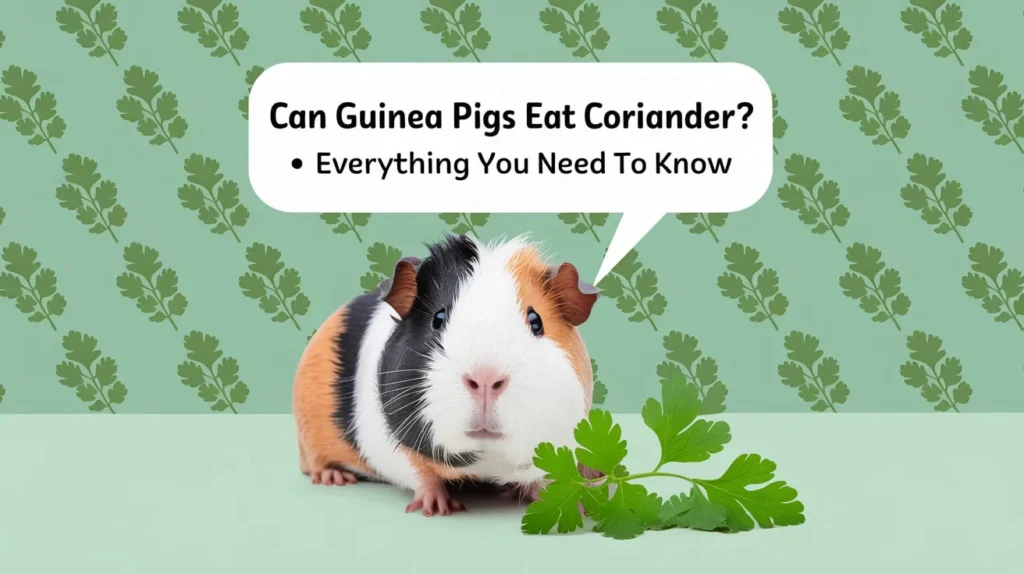Coriander, also known as cilantro, is a common herb used in kitchens worldwide. But if you’re a guinea pig owner, you might wonder: Can guinea pigs eat coriander? The short answer is yes, but with certain precautions. This herb offers essential nutrients that benefit guinea pigs, but improper feeding can lead to health issues.
In this guide, you’ll learn about coriander’s nutritional benefits, potential risks, feeding guidelines, and how to grow it at home. Let’s dive in! 😃
Nutritional Value of Coriander for Guinea Pigs 🍃
Coriander is packed with essential nutrients, making it a great addition to your guinea pig’s diet. Below is a nutritional breakdown per 100 grams of coriander:
| Nutrient | Amount | Benefits for Guinea Pigs |
| Vitamin C | 27 mg | Boosts immunity, prevents scurvy |
| Vitamin K | 310 mcg | Supports bone health |
| Calcium | 67 mg | Necessary for bones, but excess can cause bladder stones |
| Phosphorus | 48 mg | Supports energy metabolism |
| Fiber | 2.8 g | Aids digestion and gut health |
| Water | 92.2 g | Helps with hydration |
👉 Guinea pigs need vitamin C daily since their bodies can’t produce it naturally. Coriander is an excellent natural source of this vital nutrient!
Health Benefits of Coriander for Guinea Pigs 🥗
1. Prevents Scurvy 🛑
Guinea pigs are prone to scurvy, a vitamin C deficiency that leads to lethargy, joint pain, and weight loss. Coriander helps prevent this condition due to its high vitamin C content.
2. Aids Digestion 🍽️
The fiber in coriander supports a healthy digestive system and prevents constipation. A small portion of coriander mixed with other veggies ensures smooth digestion.
3. Rich in Antioxidants 🛡️
Coriander contains antioxidants, which help reduce inflammation and improve overall health.
4. Low in Sugar and Fat ❌🍭
Unlike fruits, which contain high sugar levels, coriander is a low-calorie food that won’t cause weight gain or digestive issues when fed in moderation.
Potential Risks of Feeding Coriander to Guinea Pigs ⚠️
While coriander is nutritious, overfeeding can cause health problems. Here are some risks to be aware of:
1. Digestive Upset 🤢
Excessive coriander consumption can cause bloating and diarrhea. Introduce it gradually into your guinea pig’s diet to monitor any reactions.
2. Calcium Content and Bladder Stones 🏥
Too much calcium can lead to bladder stones, a painful condition common in guinea pigs. Coriander contains moderate calcium, so feed it in moderation alongside low-calcium vegetables.
3. Pesticide Contamination 🧴
Store-bought coriander may contain pesticide residues, which can be harmful. Always wash coriander thoroughly before feeding it.
How to Feed Coriander to Guinea Pigs 🥦
✅ Safe Feeding Guidelines:
- Offer a few leaves (5-10 grams) 2-3 times per week.
- Mix it with other safe greens like romaine lettuce, bell peppers, or cucumber.
- Ensure the coriander is fresh, washed, and pesticide-free.
❌ Avoid These Mistakes:
- Don’t feed dried coriander, as it lacks moisture and nutrients.
- Don’t feed coriander daily, as excess calcium can cause urinary issues.
- Don’t mix coriander with high-calcium veggies like spinach.
Can Guinea Pigs Eat the Whole Herb? 🌿
🍃 Leaves – YES!
Coriander leaves are the safest part to feed your guinea pig. They contain the most nutrients and have a mild taste.
🌱 Stems – YES, in Small Amounts!
The stems are safe but should be fed in small quantities as they can be tough and fibrous.
🌾 Roots – NO!
Coriander roots are too tough and may cause choking. Avoid feeding them to guinea pigs.
Growing Coriander at Home for Guinea Pigs 🌱🏡
Want fresh, pesticide-free coriander? Growing it at home is easy and cost-effective!
🌿 Steps to Grow Coriander:
- Choose organic coriander seeds.
- Plant in well-draining soil in a pot or garden.
- Place in a sunny area with partial shade.
- Water lightly every 2-3 days.
- Harvest fresh leaves once the plant matures (about 4 weeks).
Growing coriander ensures a steady supply of fresh, safe food for your guinea pigs! 🥬
Nutritional Comparison: Coriander vs. Other Herbs 🌿⚖️
Wondering how coriander compares to other herbs? Here’s a quick comparison:
| Herb | Vitamin C (mg per 100g) | Calcium (mg per 100g) | Safe for Guinea Pigs? |
| Coriander | 27 | 67 | Yes, in moderation |
| Parsley | 133 | 138 | Yes, but high in calcium |
| Basil | 18 | 177 | Yes, but only in small amounts |
| Mint | 31 | 243 | Yes, but may cause gas |
👉 Coriander is one of the best herbs for guinea pigs due to its balance of vitamin C and moderate calcium levels.
Conclusion 🎯
So, can guinea pigs eat coriander? Yes! Coriander is a great addition to a guinea pig’s diet, providing essential nutrients like vitamin C, fiber, and antioxidants. However, it should be fed in moderation to avoid digestive issues and excess calcium intake.
By following proper feeding guidelines and growing coriander at home, you can ensure your guinea pig gets the best nutrition possible! 🌱🐹
FAQ ❓
Can guinea pigs eat coriander daily?
No, it’s best to feed coriander 2-3 times per week to prevent excess calcium intake.
What happens if my guinea pig eats too much coriander?
Overfeeding can cause diarrhea, bloating, or bladder stones due to its calcium content.
Can baby guinea pigs eat coriander?
Yes, but introduce it gradually and in small amounts to monitor digestion.
Can guinea pigs eat coriander seeds?
No, seeds are hard to digest and can pose a choking hazard.
What are the best veggies to pair with coriander?
Safe options include bell peppers, lettuce, cucumbers, and zucchini.

